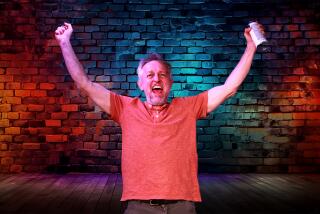JEKYLL AND HYDE RETURN IN NEW PLAY AT LYCEUM
- Share via
SAN DIEGO — On the darkened Lyceum Stage, a dress rehearsal is under way. You can see from the costumes and minimal scenery that the time is about 100 years ago, during the reign of Queen Victoria, a period of repressed desires and straight-laced morality.
In real time, it is only a few days before previews begin for the world premiere of Douglas Jacobs’ stage adaptation of Robert Louis Stevenson’s “The Strange Case of Dr. Jekyll and Mr. Hyde.”
Stage hands make one of dozens of required scene changes, shifting the focus away from Dr. Henry Jekyll’s laboratory. It is a two-story set that catches jarringly on a wardrobe where an actress sits. Jacobs helps the stage hands. “We’ll work on the scene change later,” he says, moving ahead with the rehearsal.
With opening night approaching, there was plenty to concern Jacobs, co-founder and artistic director of the San Diego Repertory Theatre, who also is directing the play.
With its constant scene changes, the play is in many ways like a movie. “I thought I had to create a series of short, crisp images,” Jacobs said. “It’s filmic in that way, but not like the films made of the story.”
Indeed, playgoers should not confuse Jacobs’ adaptation with the Hollywood versions of “Jekyll and Hyde,” the tale of a man who takes a potion that turns him into a monstrous embodiment of evil. Focusing less on the melodramatic horror of the transformation, Jacobs’ version homes in on Stevenson’s concerns about the duality--and perhaps plurality--of man’s nature.
Jacobs emphasized the struggle of Dr. Henry Jekyll with his contending natures by writing the part for two actors and staged it with “an almost stream-of-consciousness approach.”
Leaving Victorian England for a supper break, Jacobs explained why he adapted the story into a play, which opens tonight.
“I read ‘Jekyll and Hyde’ three years ago on a whim and was surprised how different it was from the movies,” he said. “I found how complex it was psychologically. It’s not a monster story. It has powerful psychological roots.
“Yes, it’s a horror story. But there are different ways of triggering horror and mystery. Fear of disillusion or of changing into something you don’t recognize is very horrifying. The change to Jekyll and Hyde and back is really a metaphor for change. If you can’t learn how to change, then you’re really messed up.
“The process of change is inevitable. Whether you grow to something more balanced or shrink yourself into something narrower, you are going to change.”
In Jacobs’ stage adaptation, Jekyll still drinks a potion that liberates Hyde--Jekyll’s darker side. In terms of the concept of multiple personalities, Jacobs believes that the story was “very prophetic of where psychology came in the last 100 years.”
This isn’t the first literary work Jacobs has adapted for the stage. For 10 years, the Rep has staged his adaptation of Charles Dickens’ “A Christmas Carol” during the holiday season.
“I find I learn a lot about theater and writing by taking a novel from a really good writer and adapting it for the stage,” Jacobs said. Short scenes from “Jekyll and Hyde” reminded him of those in “A Christmas Carol.”
“Dickens and Stevenson loved the theater. Both tried to write plays and failed, . . . but their vision was inherently theatrical. They wrote for the ear.”
A big difference between Stevenson’s story and Jacobs’ retelling of it is that Hyde is less a monster than a libertine, which Jacobs said could be seen as monstrous from a Victorian’s perspective.
“It’s about the tussle between him and his dual nature”--not about a monster and the outside world, Jacobs said. “There’s real drama between Jekyll and Hyde. The real violence is directed at himself.”
That conflict is another reason Jacobs chose to adapt it, and conflict is a key reason he works in theater.
“If you want to show a certain mood or need or idea, you write a poem,” Jacobs said. A novel works best for probing deeply into an issue and for developing characters. “But if you really want to potently explore the conflicts of life,” he said, “then drama or comedy becomes your arena.”
More to Read
The biggest entertainment stories
Get our big stories about Hollywood, film, television, music, arts, culture and more right in your inbox as soon as they publish.
You may occasionally receive promotional content from the Los Angeles Times.










